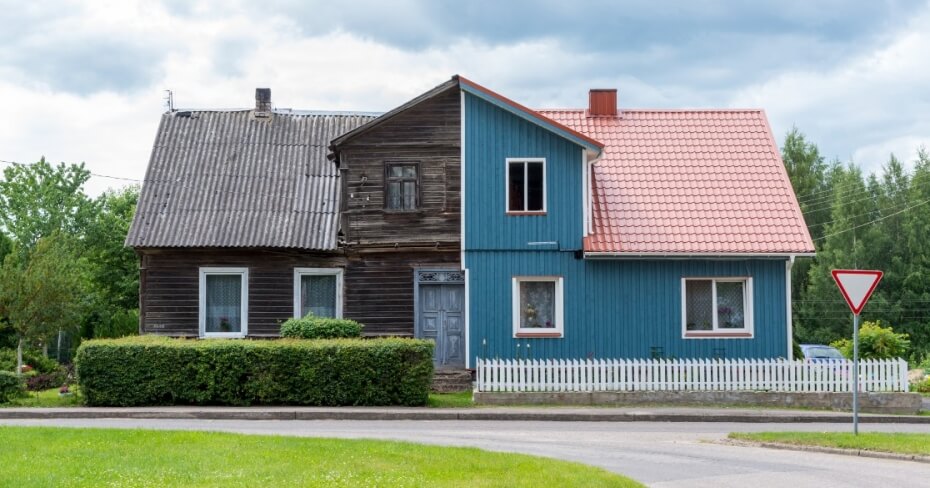In Canada, being house poor means spending most of your income on housing, leaving little room for other essentials or savings. As real estate prices rise in Toronto and Vancouver, many Canadians spend most of their earnings on housing. These include mortgages, property taxes, and maintenance. Pre-approved mortgages and low interest rates often make people buy houses they might be unable to afford. This financial strain can lead to stress and limit one’s ability to enjoy other aspects of life. This shows the importance of balanced financial planning and realistic home-buying decisions.
This article will provide strategies on how to avoid being house poor and how to get out of being house poor. But first, let’s define what is being house poor.
What is it Like to Be House Poor in Canada?

House poor means you own a house but can’t afford to maintain it. These situations arise when you buy something you cannot afford. Then, you realise it was a bad decision. It’s normal, isn’t it? It happens to many of us. But buying a house is a big financial step. It means that you have settled, have a steady income, and have control over your savings. However, if managing all the checklist items becomes a major burden due to the house you own, along with mortgage payments and maintenance costs charged to your credit cards, you may be considered being house poor.
House poverty forces you to spend most of your income on your home, compromising basic needs like food, clothes, education, and entertainment, leaving no room for savings. This dwindles your lifestyle and impacts your mental health as your house drains your finances.
How Do People Become House Poor in Canada?
Owning a house is a big step, and the idea of a ‘dream house’ can distract one from the responsibilities that come with it. Eye-catching bank advertisements, government policies with low interest rates, and big pre-approved loans maximise people’s budgets to buy expensive homes in a posh locality. They often forget about other expenses like renovations, electricity bills or the cost of documentation like purchasing a title. With a tight budget, they use their savings or credit cards, leading to debt and financial stress, making them house poor. To avoid being house poor, plan and budget carefully.
What are The Consequences of Being House Poor?
After finding themselves in a loop of debt, people start paying huge electricity bills and maintenance costs. Their salary dries up before the month ends, leaving alone the idea of savings. Inflation hits, the cost of living in a posh area starts snatching money from their pocket, and they have no savings for a rainy day. They take more loans, which becomes a monotonous financial and mental stress cycle. This leads to consequences such as –
-
- Losing a job
- Changes in the cost of living
- Medical emergencies
- Sudden unplanned expenses
To handle these inevitable issues, one must have the financial and mental bandwidth, which is already strained by monthly mortgage payments and other expenses. Debt grows faster than income, leaving no room for spending on things that bring ease and joy to one’s life.
This is a nightmare for many who don’t consider the feasibility of owning a house and skip planning. They end up house poor, live in distress and remain stuck in the same old pattern when it’s time to settle.
Tips on How to Avoid Being House Poor in Canada

There are many ways to make things easier for the future, such as doing things differently or making better choices. Some of them are listed below-
Determining The Debt-To-Income Ratio
A debt-to-income ratio is the percentage of your income you spend to pay the monthly debt. According to the general rule of thumb, one should not spend more than 36% of their income on debts, including personal loans, credit card bills, and mortgage payments. For a generalised idea, here’s how debt-to-income ratios go –
|
Debt-to-Income Ratio |
Grade |
|
0 to 36% |
Great |
|
37 to 41% |
Ok |
|
42 to 49% |
Poor |
|
More than 50% |
Bad |
So, one should calculate their debt-to-income ratio before maximising their approved mortgage to buy a house. Planning it accordingly would help them from being house poor.
Lowering The Loan-To-Value Ratio
To avoid being house poor, try lowering your monthly EMI and cutting down on monthly liquid expenses. Making a higher down payment can also help, as it reduces your loan amount and monthly mortgage payment. With a small loan amount, you will get better terms from the bank and may not need collateral, as the bank’s risk is lower.
Long-Term Loan Plan
Long-term loan plans often have high interest rates, so people settle for shorter plans with lower interest rates. However, one can use long-term plans to their advantage by carefully analysing their financial assets and liquid income. A long-term loan plan means paying more interest, but it can be a great solution if your monthly income is tight. For example, changing a 15-year loan plan to 30 years reduces monthly payments by half, freeing up money for other investments and reducing financial stress.
How to Cope and Recover If You Are House Poor?
If you are in financial distress, here are steps on how to get out of being house poor –
Replan Your Expenses
If you are house poor, things might be going differently than planned. You need to rethink your plan and remould your flow of payments, which includes –
-
- Maintain an expense sheet to know where you can reduce your expenses.
- Smartly remodel your grocery expenses
- Cancel unnecessary subscriptions
- Save on utility costs
- Lower the limit of your credit cards
- Look for cheaper insurance
There might be many other ways to consolidate your monthly expenses, but the first step is to note where exactly you are spending your money. This will help you make a clear decision about where and how much you want to spend.
Pick-Up Side Hustles
The most common way to manage your spending is by earning more. It is a laborious solution but effective. Here are some ideas –
-
- Apply for a part-time job which you can do in your free time.
- Add more skills to your job profile.
- Start some small home business that can run on autopilot.
These side jobs can cover extra expenses, reducing stress on your main income. You don’t need to do this for a long time; even one year can help ease your financial stress and give you time to find other solutions.
Refinance the House
This is a far-fetched option to consider only if you don’t have cash in hand or can’t afford the monthly payments. Refinancing means taking a new loan to pay off the current one, which changes the conditions, interest rates, loan terms and payment schedule. Even if you need to reduce monthly payments, ensure the new loan terms meet your needs to avoid ending up in the same financial situation again.
Sell the House
Selling the house is a big decision and should only be taken in the worst circumstances. It’s a stressful process and requires careful consideration, especially if it is your ‘dream house’. However, if you do sell and make a profit, first clear the entire mortgage. Then, look for a smaller home within your budget, or reassess your finances and take out a new mortgage accordingly.
Conclusion
Financial health is an important aspect of your personal and professional life. Being house poor harms your finances and affects your mental health. Nearly a third of Canadians feel house poor, but this problem can be managed. Reassess your financial situation, create new monthly budgets, and consider steps like finding a side hustle or refinancing your current loan. To avoid being house poor in Canada, carefully evaluate your finances before buying a house. Seek professional advice if unsure about taking a loan. Your home should provide comfort and security, not stress and lifestyle compromises.
Frequently Asked Questions (FAQs)
How many Canadians are house poor?
Over 25% of Canadians feel they are house poor and struggle with maintaining house costs.
How do you end up house poor?
You can end up being house poor by purchasing a home that exceeds your financial capacity and spending a major chunk of your income on mortgages and interest.
What is considered poor in Canada?
Spending more than 42% of your income on loans and mortgages in Canada is considered poor.
What causes the poverty trap?
In Canada, the poverty trap is caused by low income, lack of education, and unequal opportunities. Spending more than one's income can also lead to falling below the poverty line.
What are the six types of poverty?
The six types of poverty are absolute, relative, persistent, transitional, situational, and child poverty.



































